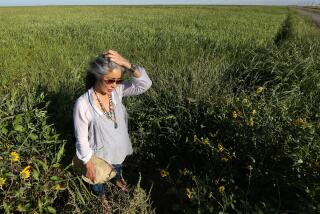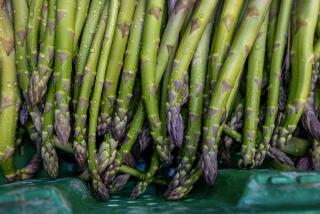Family’s Watercress Crop Washed Away
- Share via
FILLMORE — It took 15 years for the Morris family to establish itself as one of the West Coast’s chief producers of watercress, a trendy vegetable commanding top dollar at gourmet groceries across the country.
It took just a few hours for a rain-engorged Santa Clara River to literally wash that accomplishment away.
By their own estimate, the family’s 113-acre riverside farming operation suffered at least $1 million in damage during this week’s storms.
About 45 acres--including the entire 20-acre watercress crop--was submerged in 8 feet of raging water when the river changed course upstream of their property.
The torrent dragged off about 120 orange trees and came within 20 feet of their vegetable packing and icing facility.
“I couldn’t believe the water could do that much damage that quick,” Chap Morris Jr., 36, said Tuesday while working at the family car dealership in Fillmore. “It was a good 200 yards of protected area that went like it was nothing.”
Like many other farmers along the flooding Santa Clara, the Morrises are concerned the land is no longer theirs, but the river’s. They worry that the acres they can farm will be diminished.
Adding to their woes, county flood control officials have told them their problem is theirs alone because it occurred on private property, Morris said.
“We suffered a million in damage easy, and probably more if we try to restore what we had. We suffered $500,000 in watercress alone. We only saved about 10% of our equipment,” he said.
“But that [the land] is our biggest concern.”
Expanding the watercress operation five years ago was a complex feat, balancing the interests of the state Department of Fish and Game, the county’s Flood Control District and the family. In addition to the ponds where the watercress was grown, the family built a series of ponds for the river’s wildlife.
Now that balancing act seems lopsided, Morris said. He wishes they could have done more to protect their investment.
“Ecology is important--I firmly believe that,” Morris said. “But when it takes away someone’s livelihood, there’s something wrong.”


